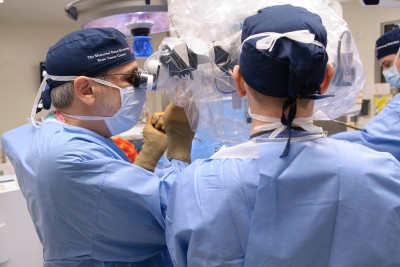
As a neurosurgical oncology fellow at Memorial Sloan Kettering, Toral Patel has been able to train and develop a career that combines clinical practice with research. Born in Houston, Dr. Patel got her undergraduate degree from Johns Hopkins University in Baltimore before heading down to Dallas, where she earned her medical degree at the University of Texas Southwestern Medical School. Before joining MSK, she completed her residency at Yale-New Haven Hospital in New Haven, Connecticut.
Why did you choose Memorial Sloan Kettering for your fellowship?
There were several factors I considered when I was selecting a neuro-oncology fellowship. First and foremost, I looked for a program with a solid clinical experience, encompassing the full breadth of neurosurgical oncology. I also looked for fellowships with established neurosurgical faculty who had a consistent record of leadership and innovation within the field. I also sought a program with exposure to both high-caliber research and medical neuro-oncology.
MSK met and exceeded each of these requirements. Choosing this fellowship was a no-brainer; it offers an intense, well-rounded, multidisciplinary experience in neuro-oncology. Additionally, the faculty is second to none. They are absolute leaders in their field and take a genuine interest in the career development of their fellows.
How does this fellowship year compare to residency?
In many ways, fellowship year is similar to the best parts of chief residency. At MSK, there’s a high level of autonomy in the operating room and a focus on taking the most challenging cases. However, unlike residency, you get to concentrate entirely on neuro-oncology, which is an incredible educational experience. This allows for fine-tuning of your operative skills and clinical decision making.
In addition to the operative experience, the MSK fellowship offers ample opportunities to teach and develop your leadership skills, both in and out of the OR. This is particularly beneficial for individuals who are seeking an academic career.
Finally, the MSK fellowship places a particular emphasis on continuity of care, which can be lacking in residency training. Fellows see their patients not only in the hospital but also during pre- and postoperative clinic visits. This experience is invaluable as you prepare to start your own practice.
What research opportunities did you have as a fellow?
The research opportunities at MSK are endless. As a fellow, you have access to an extensive clinical neuro-oncology database. Due to the sheer volume of patients treated at MSK, almost any clinical question can be posed and answered with the existing clinical data. This type of outcomes work is the primary research opportunity that fellows engage in.
Additionally, due to their national prominence, MSK faculty members are often invited to contribute chapters and review articles for reputable publications. Fellows often participate in these activities. Finally, for those who are interested in pursuing basic science research at MSK, an additional fellowship year can be arranged. This has been done successfully several times in the past, and there’s a robust group of research labs to choose from.
The department also provides financial support for each fellow to attend at least one major conference per year. This is an excellent opportunity to network and present research.
What else does MSK offer that’s unique?
One of the best parts of being at MSK is that you’re surrounded by brilliant people who are all interested in treating cancer. This type of focused intellectual effort makes for a very stimulating environment. Each and every day, there are a myriad of talks to attend and informal conversations to be had. This aspect of the MSK experience is exceptional, motivating, and the perfect prelude to an academic career.
How is life in New York City? Do fellows have a social life?
Life in NYC is fantastic. MSK does a wonderful job of setting its fellows up with high-quality, affordable housing. Living on the Upper East Side is convenient and safe; both single people and families fit in well. Call duty is very reasonable for fellows — you can expect to get a call at home in one case out of four — and there are nurse practitioners in the hospital 24/7 to assist you. MSK housing is a short, walkable distance to the hospital.
Almost any interest you want to pursue is at your fingertips while living in the city. In fact, there’s rarely a dull moment! Because of the way call duty is arranged, fellows have three weekends off per month, so you’ll have ample time to explore the city, travel, etc. MSK also tries to engage fellows through weekly happy hours, fitness/nutrition classes, and various interest groups.
How will your time at MSK stick with you?
There are several aspects of the MSK experience that will stick with me. I’m certain that having the MSK “stamp” on my resume has helped me in my job search. Coming from an institution like MSK is invaluable when trying to establish yourself early on in your career.
More significant than the MSK name, however, has been the genuine mentorship and friendship that I received from the faculty. The warmth and generosity of advice that they provide to their fellows is simply outstanding. Their assistance in career planning and the manner in which they executed their own careers is of tremendous value.
Finally, being at MSK has emphasized to me the idea that a multidisciplinary group of talented individuals can focus their efforts and move a field forward. I look forward to taking this approach in my own career.